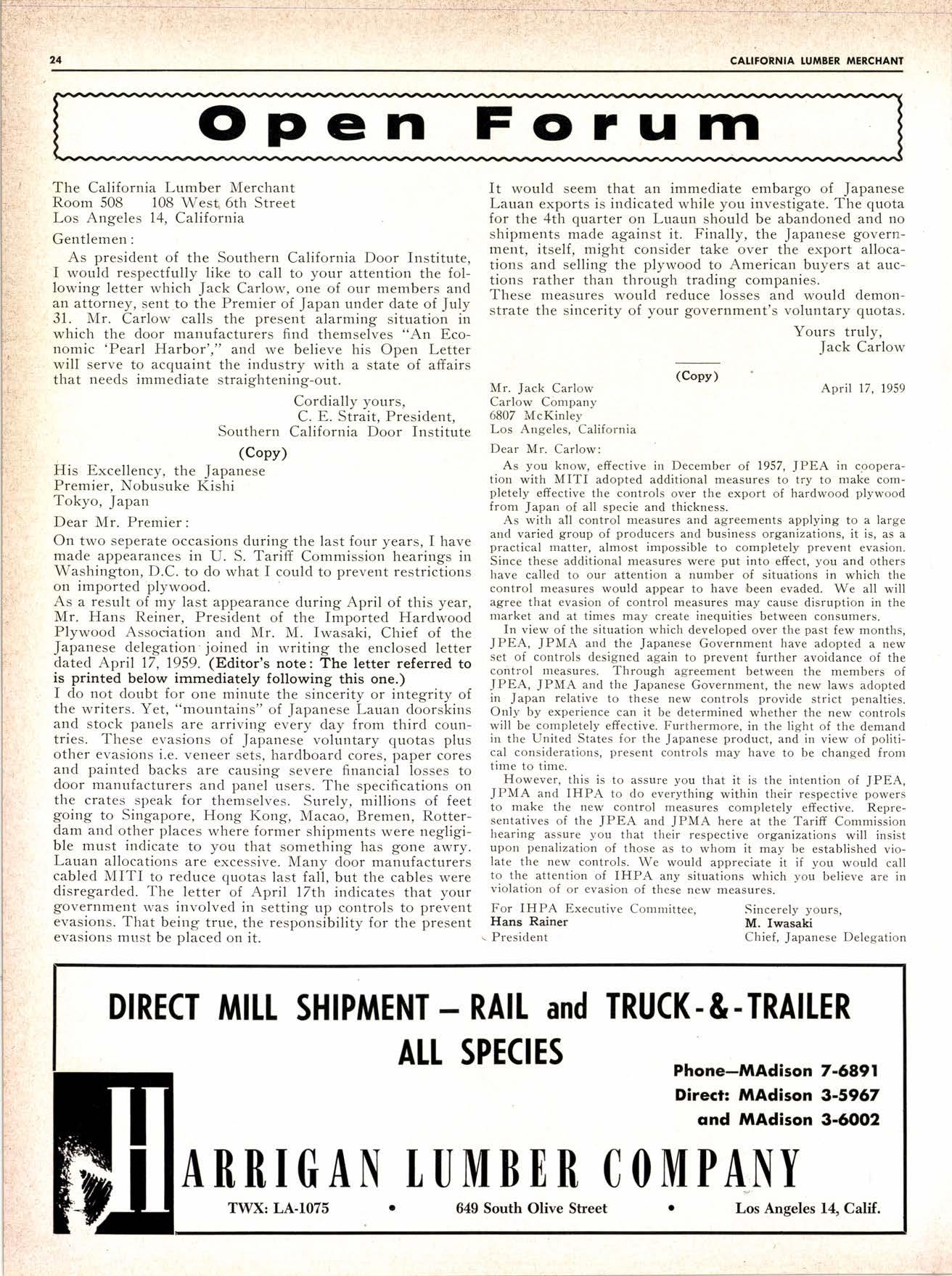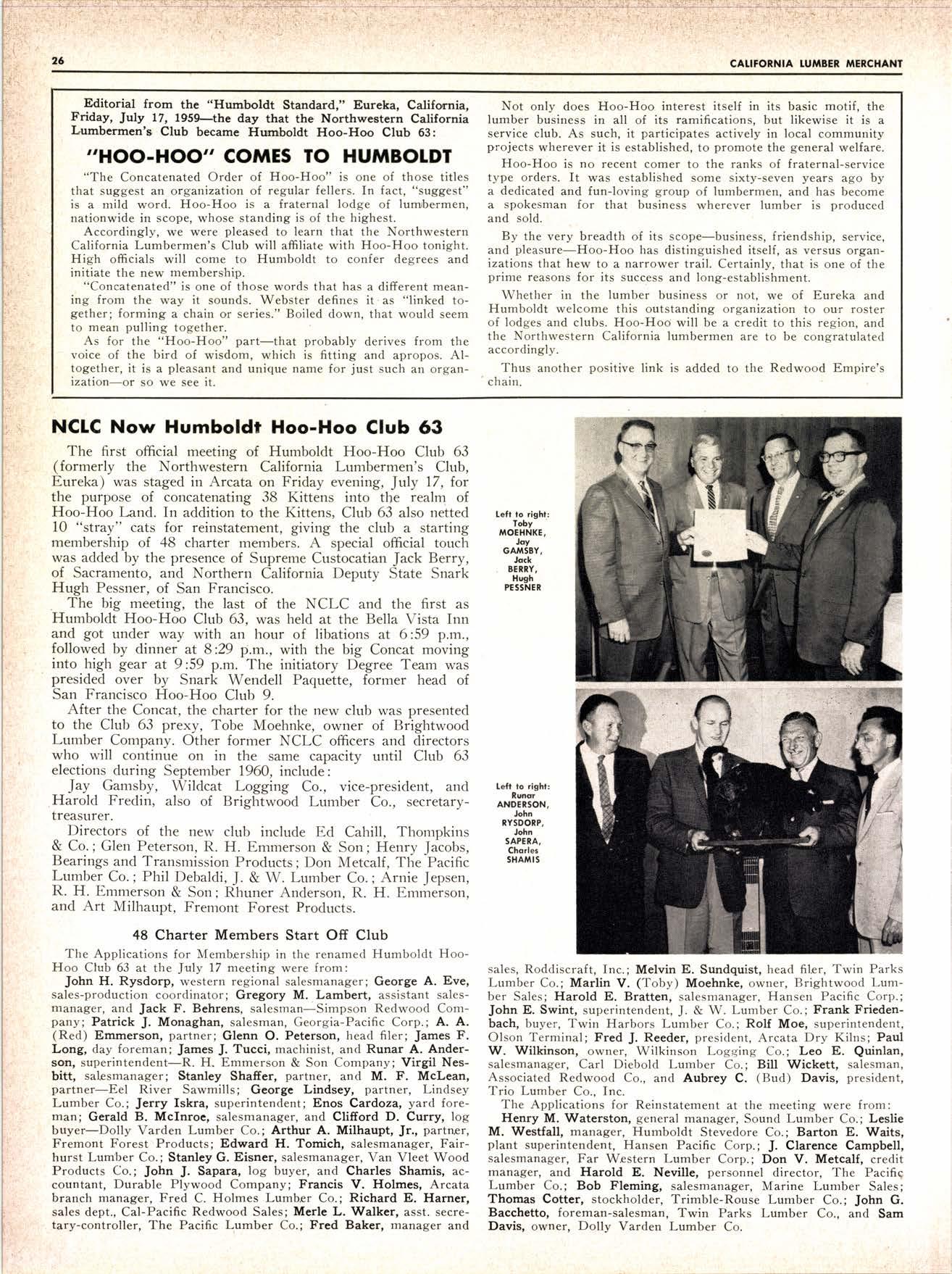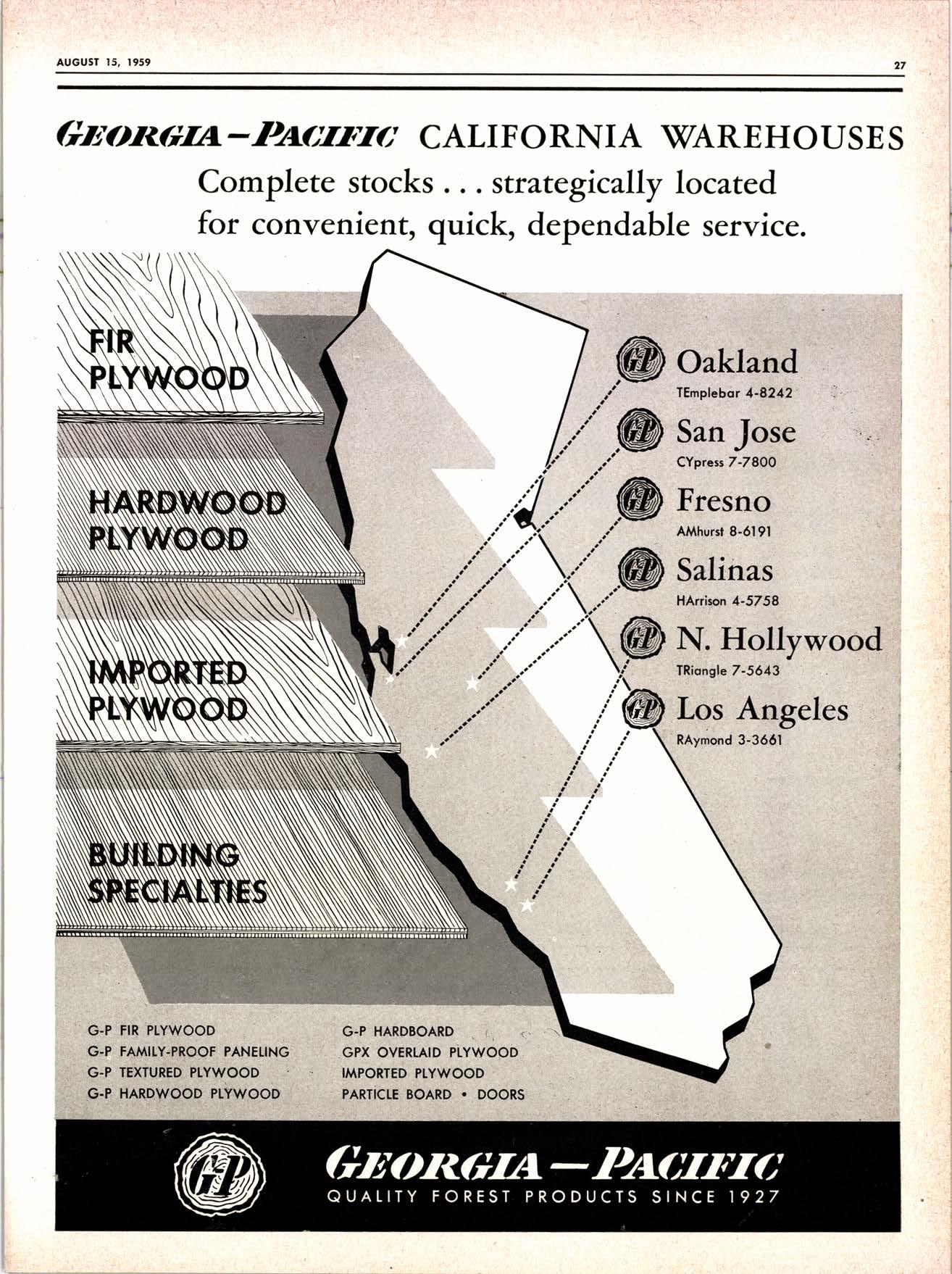
7 minute read
Opera Folurrr
The California Lumber Merchant Room 508 108 West 6th Street Los Angeles 14, California
Gentlemen:
As president of the Southern California Door Institute, I would respectfully like to call to your attention the following letter which Jack Carlow, one of our members and an attorney, sent.to the Premier of Japan under date of July 31. Mr. Carlow calls the present alarming situation in which the door manufacturers find themselves "An Economic 'Pearl Harbor'," and we believe his Open Letter will serve to acquaint the industry with a state of affairs that needs immediate straightening-out.
Cordially yours, C. E. Strait. President. Southern California Door Institute (copv)
His Excellency, the Japanese Premier. Nobusuke Kishi Tokyo, Japan
Dear Mr. Premier:
On two seperate occasions during the last four years, I have made appearances in U. S. Tariff Commission hearings in Washington, D.C. to do what I could to prevent restrictions on imported plywood.
As a result of my last appearance during April of this year, Mr. Hans Reiner, President of the Imported Hardwood Plywood Association and Mr. M. Iwasaki, Chief of the Japanese delegation joined in writing the enclosed letter dated April 17, 1959. (Editor's note: The letter referred to is printed below immediately following this one.)
I do not doubt for one minute the sincerity or integrity of the writers. Yet, "mountains" of Japanese Lauan doorskins and stock panels are arriving every day from third countries. These evasions of Japanese voluntary quotas plus other evasions i.e. veneer sets, hardboard cores, paper cores and painted backs are causing severe financial losses to door manufacturers and panel users. The specifications on the crates speak for themselves. Surelv. millions of feet going to Singapore. Hong Kong, ilIacao.'Bremen, Rotterdam and other places where former shipments were negligible must indicate to you that something has gone awry. Lauan allocations are excessive. Many door manufacturers cabled MITI to reduce quotas last fali, but the cables were disregarded. The letter of April 17th indicates that your g'overnment was involved in setting up controls to prevent evasions. That being true, the responsibility for the present evasions mtr.st be placed on it.
It would seem that an immediate embargo of Japanese Lauan exports is indicated while you investigate. The quota for the 4th quarter on Luaun should be abandoned and no shipments made against it. Finally, the Japanese government, itself, might consider take over the export allocations and selling the plywood to American buyers at auctions rather than through trading companies.
These measures would reduce losses and would demonstrate the sincerity of your government's voluntary quotas.
Yours trulv.
Jack Cirlow (copv)
Mr. Jack Carlow Carlow Company
6807 McKinley
Los Angeles, California
Dear Mr. Carlow:
April 17, 1959
As you know, effective in December of 1957, JPEA in c,ooperation with MITI adopted additional measures to try to make completely offective the controls over the export of hardwood plywood from Japan of all specie and thickness.
As with all control measures and agreements applying to a large and varied group of producers and business organizations, it is, as a practical matter, almost impossible to completely prevent evasion. Since these additional measures were put into effect, you and others have called to our attention a number of situations in which the control measures would appear to have 'been evaded. We all will agree that evasion of control measures may cause disruption in the market and at times may create inequities between consumers.
In view of the situation which developed over the past few months, JPEA, JPMA and the Japanese Government have adopted a new set of controls designed again to prevent further avoidance of the control measures. Through agreement between the members of JPEA, JPMA and the Japanese Government, the new laws adopted in Japan relative to these new controls provide strict penalties. Only by experience can it be determined whether the new controls will be completely effective. Furthermore, in the light of the demand in the United States for the Japanese product, and in view of political considerations, present controls may have to be changed from time to time.
However, this is to assure you that it is the intention of JPEA, JPMA and IHPA to do everything within their respective powers to make the new control measures completely effective. Representatives of the JPEA and JPMA here at the Tariff Commission hearing assure you that their respective organizations will insist upon penalization of those as to whom it may be established violate the new controls. We would appreciate it if you would call to the attention of IHPA any situations which you believe are in violation of or evasion of these ncw measures.
For
IHPA Executive Conrmittee,
Hans Rainer President
Sincerely yours,
M. Iwasaki Chief, Japanese Delegation

Editorial from the 'Humboldt Standard," Eureka, California, Friday, luly 17, 1959-the day that the Northwestern California Lunobermen's Club became Hrunboldt Hoo-Hoo Ctub 63:
,,HOO.HOO" COMES TO HUMBOTDT
"The Concatenated Order of Hoo-Hoo" is one of those titles that suggest an organization of regular fellers. In fact, "suggest" is a mild word. Hoo-Hoo is a fraternal lodge of lumrbermen, nationwide in scope, whose standing is of the highest.
Accordingly, we were pleased to learn that the Northwestern California Lumbermen's Club will affiliate with Hoo-Hoo tonight. High officials will come to Humboldt to confer degrees and initiate the new membership.
"Concatenated" is one of those words that has a different meaning from the way it sounds. Webster defines it.as "linked together; forming a chain or series." Boiled down, that would seem to mean pulling together.
As for the "Hoo-Hoo" part-that probably derives from the voice of the bird of wisdom, which is fitting and apropos. Altogether, it is a pleasant and unique name for just such an organization-or so we see it.
NCLC Now Humboldt Hoo-Hoo Glub 63
The first official meeting of Humboldt Hoo-Hoo Club 63 (formerly the Northwestern California Lumbermen's Club, Eureka) was staged in Arcata on Friday evening, July 77, f.or the purpose of concatenating 38 Kittens into the realm of Hoo-Hoo Land. In addition to the Kittens, Club 63 also netted 10 "stray" cats for reinstatement, giving the club a starting membership of 48 charter members. A special official touch was added by the presence of Supreme Custocatian Jack Berry, of Sacramento, and Northern California Deputy State Snark Hugh Pessner, of San Francisco.
. The big meeting, the last of the NCLC and the first as Humboldt Hoo-Hoo Club 63, was held at the Bella Vista Inn and got under way with an hour of libations at 6:59 p.m., followed by dinner at 8:29 p.m., with the big Concat moving into high gear at 9:59 p.m. The initiatory Degree Team was presided over by Snark Wendell Paquette, former head of San Francisco Hoo-Hoo Club 9.
After the Concat, the charter for the new club was presented to the Club 63 prexy, Tobe Moehnke, owner of Brightwood Lumber Company. Other former NCLC officers and directors who will continue on in the same capacity until Club 63 elections during September 1960, include:
Jay Gan-rsby, Wildcat Logging Co., vice-president, and Harold Fredin, also of Brightwood Lumber Co., secretarytreasurer.
Directors of the new club include trd Cahill. Thon,pkins I Co. ; Glen Peterson, R. H. Emmerson & Son; Henry Jacobs, Bearings and Transmission Products; Don Metcalf, The Pacific !"ry!"1Co.; Phil Debaldi, J. & W. Lumber Co.; Arnie Jepsen, R. H. Emmerson & Son; Rhuner Anderson, R. H. Emmerson, and Art Milhaupt, Fremont Forest Products.
48 Charter Members Start Off Club
The Applications for Membership in the renamed Humboldt HooHoo Club 63 at the July 17 meeting were from:
John H. Rysdorp, western regional salesmanager; George A. Eve, sales-production coordinator; Gregory M. Lambert, assistant salesmanager, and Jack F. Behrens, salesman-simpson Redwood Company; Patrick J. Monaghan, salesman, Georgia-Pacific Corp.; A. A. (Red) Emmerson, partner; Glenn O. Peterson, head filer; James F. Long, day foreman; James J. Tucci, machinist, and Runar A. Anderson, superintendent-R. H. Emmerson & Son Company; Virgil Nesbitt, salesmanager; Stanley Shafrer, partner, and M. F. Mclean, partner-Eel River Sawmills; George Lindsey, partner, Lindsey Lumber Co.; Jerry Iskra, superintendent; Enos Cardoza, yard foreman; Gerald B. Mclnroe, salesmanager, and Clifford D. Currn log buyer*Dolly Varden Lumber Co.; Arthur A. Milhaupt, Jr., partner, Fremont Forest Products; Edward H. Tomich, salesmanager, Fairhurst Lumber Co.; Stanley G. Eisner, salesmanager, Van Vleet Wood Froducts Co.; John J. Sapara, log buyer, and Charles Shamis, accountant, Durable Plywood Company; Francis V. Holmes, Arcata branch manager, Fred C. Holmes Lumber Co.; Richard E. Harner, sales dept., Cal-Pacific Redwood Sales; Merle L. Walker, asst. secretary-controller, The Pacific Lumber Co.; Fred Baker, manager and
Not only does Hoo-Hoo interest itself in its basic motif, the lumber business in all of its ramifications, but likewise it is a service club. As such, it participates actively in local community projects wherever it is established, to promote the general welfare.
Hoo-Hoo is no recent comer to the ranks of fraternal-service type orders. It was established some sixty-seven years ago by a dedicated and fun-loving group of lumbermen, and has become a spokesman for that business wherever lumber is produced and sold.
By the very breadth of its scope-business, friendship, service, and pleasul6-Hoo-Hoo has distinguished itself, as versus organizations that hew to a narrower trail. Certainly, that is one of the prime reasons for its success and long-establishment.
Whether in the lumber business or not, we of Eureka and Humboldt welcome this outstanding organization to our roster of lodges and clubs. Hoo-Hoo will be a credit to this region, and the Northwestern California lumbermen are to be consratulated accordingly.
Thus another positive link is added to the Redwood Empire's chain.
Lett to.ight:RW ANDERSON, Joho NYSDORP, Jofin SAPENA, sales, Roddiscraft, Inc.; Melvin E. Sundquist, head filer, Twin Parks Lumber Co.; Marlin V. (Tobv) Moehnke, owner, Brightwood Lumber Sales; Harold E. Bratten, salesmanager, Hansen Pacific Corp.; John E, Swint, superintendent, J. & W. Lumber Co.; Frank Friedenbach, buyer, Twin Harbors Lumber Co.; Rolf Moe, superintendent, Olson Terminal; Fred J. Reeder, president, Arcata Dry Kilns; Paul W. Wilkinson, owner, Wilkinson Logging Co.; Leo E. Quinlan, salesmanager, Carl Diebold Lumber Co.; Bill Wickett, salesman, Associated Redwood Co., and Aubrey C. (Bud) Davis, president, Trio Lumber Co., Inc.

The Applications for Reinstatement at the meeting were from:
Henry M. Waterston, general manager, Sound Lumber Co.; Leslie M. Westfall, manager, Humboldt Stevedore Co.; Barton E. Waits, plant superintendent, Hansen Pacific Corp.; J. Clarence Campbell, salesmanager, Far Western Lumber Corp.; Don V. Metcalf, credit manager, and Harold E, Neville, personnel director, The Pacific Lumber Co.; Bob Fleming, salesmanager, Marine l-umber Sales; Thomas Cotter, stockholder, Trimble-Rouse Lumber Co.; John G. Bacchetto, foreman-salesman, Twin Parks Lumber Co., and Sam Davis, owner, Dolly Varden Lumber Co.











